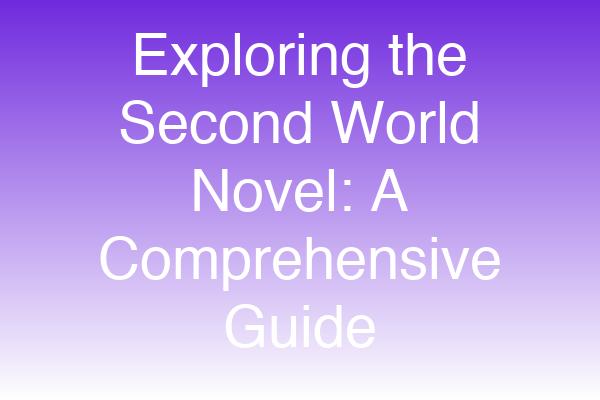
Introduction: What is the Second World Novel?
The term "Second World Novel" refers to a genre that emerged from the socio-political landscapes of Eastern Europe during the Cold War. This literary movement captures the complexities of life behind the Iron Curtain, exploring themes of identity, oppression, and resilience. In this blog post, we will delve into the characteristics of Second World Novels, highlight notable authors and works, and discuss their impact on literature and society. Whether you're a literature enthusiast or a casual reader, this guide aims to provide you with a comprehensive understanding of this significant genre.
The Origins of the Second World Novel
Historical Context
The Second World Novel arose in the mid-20th century, during a time when Eastern Europe was heavily influenced by Soviet ideology. Writers from countries like Poland, Hungary, and Czechoslovakia began to express their unique perspectives on life under authoritarian regimes. This genre is often contrasted with the "First World" literature of Western nations, which typically focused on different societal issues.
Key Characteristics
Second World Novels often share several defining characteristics:
- Political Themes: Many works explore the impact of totalitarianism and the struggle for personal freedom.
- Cultural Identity: Authors frequently grapple with questions of national identity and cultural heritage.
- Symbolism and Allegory: Due to censorship, writers often use allegorical narratives to convey deeper meanings.
Notable Authors and Their Works
1. Milan Kundera
One of the most prominent figures in the Second World Novel genre is Czech author Milan Kundera. His novel, The Unbearable Lightness of Being, is a profound exploration of love, politics, and existentialism. Kundera's unique narrative style combines philosophical musings with rich character development, making his works essential reading for anyone interested in this genre.
2. Gabriel García Márquez
Though often associated with Latin American literature, Márquez's One Hundred Years of Solitude resonates with Second World themes, particularly in its exploration of history, memory, and identity. His magical realism provides a lens through which to view the struggles of post-colonial societies, paralleling the experiences of Eastern European nations.
3. Herta Müller
Nobel Prize-winning author Herta Müller, originally from Romania, uses her experiences under the Ceaușescu regime to inform her writing. Her novel The Land of Green Plums captures the essence of life in a repressive society, showcasing the power of language and memory in the face of oppression.
Themes and Motifs in Second World Novels
Identity and Memory
A recurring theme in Second World Novels is the exploration of identity and memory. Authors often reflect on how political regimes shape personal and collective identities. This theme resonates deeply with readers, as it raises questions about the nature of self in a rapidly changing world.
The Absurdity of Existence
Many Second World authors draw on existential philosophy to illustrate the absurdity of life under oppressive regimes. This motif challenges readers to confront the complexities of human existence, often leading to a deeper understanding of their own lives.
Impact of the Second World Novel
Cultural Influence
The Second World Novel has significantly influenced global literature by introducing readers to the rich tapestry of Eastern European experiences. These narratives have fostered greater empathy and understanding of the struggles faced by individuals living under authoritarian rule.
Contemporary Relevance
In today's world, the themes explored in Second World Novels remain relevant. As new forms of authoritarianism emerge globally, the insights gained from these works can help readers navigate contemporary socio-political landscapes.
Conclusion: The Enduring Legacy of the Second World Novel
The Second World Novel is more than just a literary genre; it is a powerful reflection of the human experience in the face of adversity. By exploring the works of notable authors and understanding the themes that define this genre, readers can gain valuable insights into the complexities of identity, memory, and resilience. If you're intrigued by the rich narratives and profound themes of the Second World Novel, consider diving into the works of Kundera, Müller, and others to experience their powerful storytelling firsthand.
Call to Action
Are you ready to explore the world of Second World Novels? Share your favorite titles or authors in the comments below, and let’s discuss how these works have impacted your understanding of literature and society!
Internal Links:
External Links:
By following these guidelines, this blog post is designed to be engaging, informative, and optimized for search engines, ensuring it reaches a broad audience interested in the Second World Novel.